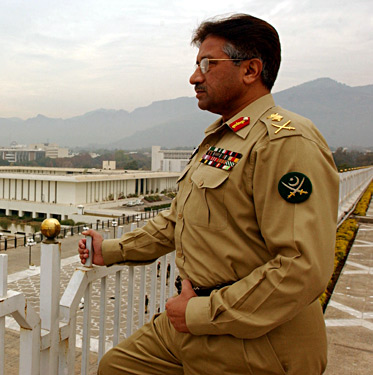
It is the first time in Pakistan’s history that a former army chief has been tried and sentenced under Article 6 of the Constitution, which states, “Any person who abrogates or subverts or suspends or holds in abeyance, or attempts or conspires to abrogate or subvert or suspend or hold in abeyance the Constitution by use of force or show force or by any other unconstitutional means shall be guilty of high treason.”
The charges against Musharraf – who was sentenced in absentia on Tuesday – stem from his imposition of a state of emergency in 2007, after which dozens of judges were placed under house arrest or sacked, sparking widespread street protests by lawyers.
The three-judge special court — comprising Justice Waqar Ahmad Seth, Justice Nazar Akbar and Justice Shahid Karim — handed down 2-1 split verdict after hearing arguments from the new prosecution team appointed by the government. A detailed verdict will be issued within 48 hours.
“Pervez Musharraf has been found guilty of Article 6 for violation of the Constitution of Pakistan,” government law officer Salman Nadeem said.
When the proceedings started on Tuesday, the prosecution team, led by Advocate Ali Zia Bajwa, prayed the court amend Musharraf’s indictment. He said the government wanted to also frame charges against Shaukat Aziz, Abdul Hamid Dogar, and Zahid Hamid, the then prime minister, chief justice of Pakistan, and law minister, respectively.
“It is imperative for all accused to be tried simultaneously. The aiders and abettors should be tried as well,” said Advocate Bajwa.
According to Clause (2) of Article 6 of the Constitution, “Any person aiding or abetting [or collaborating] the acts mentioned in Clause (1) shall likewise be guilty of high treason.
The bench remarked that the Supreme Court had already adjudicated the matter and given the government two weeks to submit a new charge sheet.
Justice Karim wondered if the government was using delaying tactics in the treason case against Musharraf. “The government should file a new complaint if it wants to add additional names in the trial,” he added.
When Justice Waqar told the prosecutor to present his arguments, Advocate Bajwa sought more time to file a formal request. “If you cannot present arguments, then leave the rostrum,” shot back an irked Justice Waqar.
The bench again observed that the special court was only bound by the apex court judgments and not by the rulings of high courts.
Appearing before the bench, Musharraf’s counsel Raza Bashir sought 15 to 20 days for his client to record a statement under Section 342 of the Criminal Procedure Code (CrPc). “Musharraf deserves the right to fair trial,” he said.
Justice Akbar noted that the former army chief had been provided six opportunities to record a statement but he didn’t. Justice Waqar added that the special court had even allowed the former military ruler to appear before the bench at his convenience.
“Musharraf should be given the right to defend himself,” Advocate Bashir implored again. “Both the prosecution team and his counsel are already defending him before the bench,” Justice Akbar shot back.
Speaking to the media after the judgment was announced, Musharraf's lawyer Akhtar Shah said the case against his client was “unfair, no doubt about that”.
“We have always maintained it was a wrong case,” he told reporters. “Pervez Musharraf has developed this country, he respected the rule of law and freedom of press, and the way he served the country, no one else did.”
Shah also sought to defend the proclamation of emergency rule by Musharraf in 2007, saying it was “good for the country during those times” and was only promulgated after extensive consultations.
Shah added that Musharraf had wanted to return to Pakistan to record a statement but had not been offered sufficient security measures to ensure his safety.
Musharraf, who has challenged the special court formation in the Lahore High Court, has a couple of options. He can challenge Tuesday’s verdict in the Supreme Court. And if the apex court upholds his conviction, he can seek a presidential pardon under Article 45 of the Constitution.
The case against the former leader had been pending since 2013, when his old rival, Nawaz Sharif, was in power. Musharraf was booked in the high treason case in December 2013 and indicted on March 31, 2014, but the trial was delayed and he left for Dubai two years later to seek treatment.
The trail continued in his long absence and the bench had been reconstituted six times as judges recused themselves from hearing the case, resulting in the delay.
Even the judgment was delayed for more than a couple of weeks. The special court was expected to announce on Nov 28 its verdict which it had reserved on November 19.
But the government, through the interior ministry, filed a petition in the Islamabad High Court (IHC) seeking to stop the special court “from passing judgment”.
Subsequently, an IHC bench, headed by Chief Justice Athar Minallah, stopped the special court from issuing the verdict and directed the government to notify a new prosecution team by Dec 5 as the government had sacked the previous prosecutors appointed by the PML-N government.
On Dec 5, Advocate Ali Zia Bajwa of the new prosecution team had sought a “reasonable amount of time” to prepare arguments. He was given until December 17 by the special court to give arguments before the verdict was announced.

















COMMENTS
Comments are moderated and generally will be posted if they are on-topic and not abusive.
For more information, please see our Comments FAQ